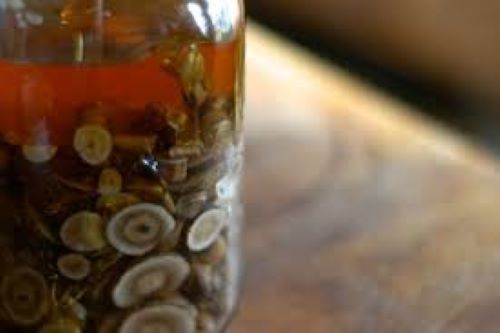_______________________________________________________________________________________________________________________
Elecampane Honey

When ingesting elecampane, you will notice an internal warming sensation causing the body to move out any excess mucus and stimulate the damp, cold congested areas of the body, particularly the lungs, to get the energy moving. This stimulating action in the lungs is called expectoration.
Often coughing comes with respiratory complaints, and thankfully elecampane's roots contain a gummy substance called inulin which relaxes irritated tissues from coughing. In short, elecampane both stimulates because it contains volatile oils and relaxes because of its mucilaginous properties, making it the perfect herb for lung congestion!
As a result, elecampane is useful for respiratory complaints from cold congestion, coughs, bronchitis and asthma. As in all things, there are always exceptions and, in this case, a dry hacking, barking cough may not benefit from the dryness of elecampane. A moistening herb may be a better choice. In any case, elecampane has been used for thousands of years by the common folks.
Elecampane Honey tastes good and children and adults alike love it!
How to Make Elecampane Honey
1. Fill a small glass jar 1/3 of the way full with cut, dried elecampane root.
2. Cover completely with raw, local honey. Stir as best you can.
3. Cap with an air-tight lid, and label the jar with the ingredients and the date.
4. Let this mixture steep together for 3-4 weeks. You may want to flip the jar upside down every so often so that the root moves back and forth through the honey and does not stay clumped together in one spot.
5. Taste the honey at intervals to see when it has reached its desired strength.
6. To strain out the herb you may need to gently (very gently!) heat the honey in a warm water bath. The heat will loosen up the honey and allow the root to be strained out more easily. But you want to be sure not to heat it up too much or you will destroy much of the nutritional goodness in the raw honey.
7. Once the root is strained out, place it in a glass jar and store it in a dark cupboard.
8. Use this honey on its own or mixed into a hot cup of tea to help with coughs, colds and stuck congestion.
Herbal Apothecary & Here on Earth
(c) Wendy Murdoch
Disclaimer: The information, including but not limited to, text, graphics, images and other material contained on this website are for informational purposes only. It is not intended to be a substitute for professional medical advice, diagnosis or treatment. Always seek the advice of your physician or other qualified health care provider with any questions you may have regarding a medical condition or treatment and before undertaking a new health care regimen.
All content in this article is for informational purposes only. The owner of these written materials makes no claims as to the accuracy or completeness of any of the information, including any links. The owner will not be liable for any errors or omissions in this information. The owner will not be liable for any losses, injuries, or damages from the use of this information.

